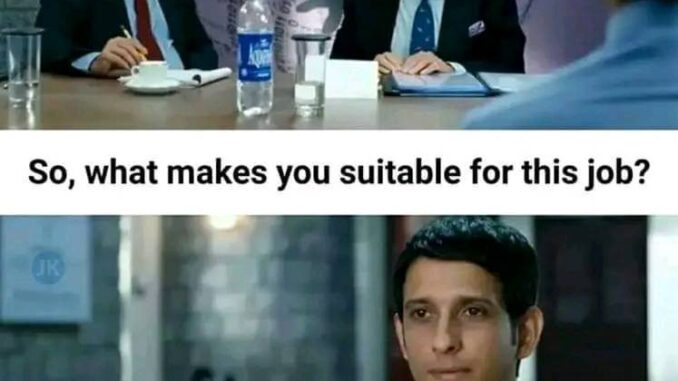
Landing an interview is probably the most crucial part of the job seeking process. Generally speaking there are two swings in the labour market – candidate short (more jobs than candidates) and job short (the other way around).
Employers are either forced to plug the gap in their workforce or can be extremely selective about hiring policies aligning with their strategic HR goals.
In certain roles, on the Coast and Australia in general, the market is candidate short. Send your resume > get a call > interview > don’t trip over the furniture > and you are hired!
So why concentrate on getting an interview if in a candidate short market if you are vaguely qualified and experienced in the role you probably will get an offer?
Well there are a few very good reasons that can affect your entire career (and not just the job you are going for).
Probably not the best way to go about getting an interview:

Preamble
Firstly you should consider the employers perspective. If they have a vacancy that drags on and on it either means work is not being done or other staff members are being overworked. This can lead to stress in the organisation and ultimately the loss of other [more experienced] staff.
Are they recruiting out of necessity or as part of their strategic HR plan?
Are they looking at candidates for their “fit” or perhaps more concerned about not losing other staff and evaluating them on core competencies only?
Think it through
We all need jobs and income so there is a precedent that we might think “job” and not “career”. Don’t get me wrong if your ambitions lie in things outside your work then it is perfectly valid for you to pick up a job based on what’s out there as opposed to a long term career view.
If however you are looking at the life ahead of you and looking for a career that involves progression and promotion then, even in a candidate short market, you need to be considerate of how you pitch your self to employers. An employer that is desperate to plug a gap in their team might not be focused on taking onboard your career aspirations and really getting to know you at the interview. In other words since you demonstrate competence the only thing on their mind is “when can you start?”.
An interview is a two way street but before even getting that point you should map out which employers in your space are going to align with the long term goals you have set. Pick them wisely. Research not just those who are advertising but also their competitors. Getting your resume into a successful firm with low staff turnover and landing an interview could be a game changer for your career.
Interview Questions – YOURS!
By now you have a list of employers that you want to approach. Regardless of if they are desperate to hire or otherwise when you make contact be consistent. You should map out the interview questions that you want answered and incorporate them in your cover letter.
“How stable is your business in terms of staff turnover and future workload/projects?”
Becomes in a cover letter:
“I am career minded and I am looking to work with a team with long term commitment to the business. A key part to my previous success has been working in firms that had future projects lined up.”
Being consistent in your approach is important because you never get a second chance to make a first impression. If your cover letter screams “I just wanna job!!!!” and at interview you ask for a 6 figure salary then you are going to tarnish your brand and confuse the interviewer.
Accepting the Job
It doesn’t really matter at this point if the interview was an informal meet and greet or an extensive panel interview and assessment. When you get an offer you have a decision to make. Will the job be a stepping stone or some career backwater that you cannot escape? Some things to bear in mind:
- Will the opportunities for promotion actually present themselves?
- If it terms out to be a dud job/employer will you be able to move to a better one or will other employers consider your employer set the hiring bar too low and discount you?
- What is your plan B?
On the other hand you could be landing the career making role and be the happiest you have ever been. The point is:
- Think it through from research to resume/CV to cover letter to interview to acceptance
- Make sure your education, skills and experience line up to the role or if they don’t know your gaps and be honest about them. Good employers build good staff up and with the right attitude you can get in the door.
- Don’t lie to yourself or to a prospective employer. Getting dismissed because you get “found out” will mean your referees will be compromised. Any decent Recruiter will see red flags is your referee is “Kathy from Accounts” and not the Head of Marketing who you reported to.
- Enjoy the process. Happy people open more doors for themselves, they know their worth and are more valued to prospective employers.
As always: Best of luck with your job seeking!
Leave a Reply
You must be logged in to post a comment.